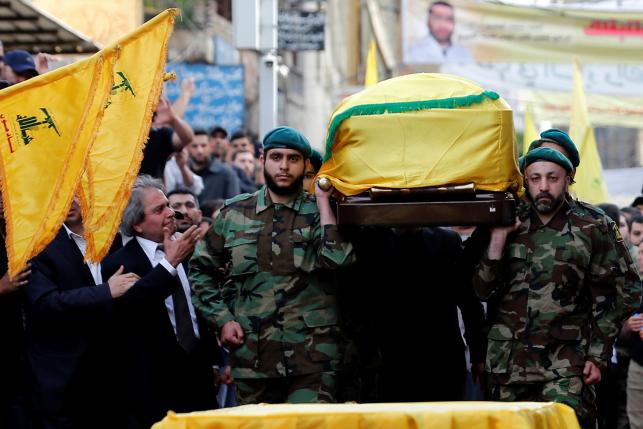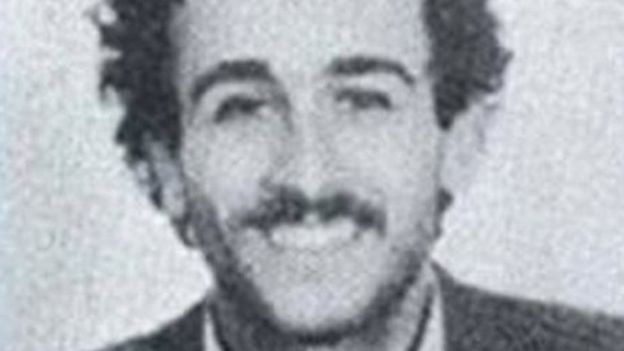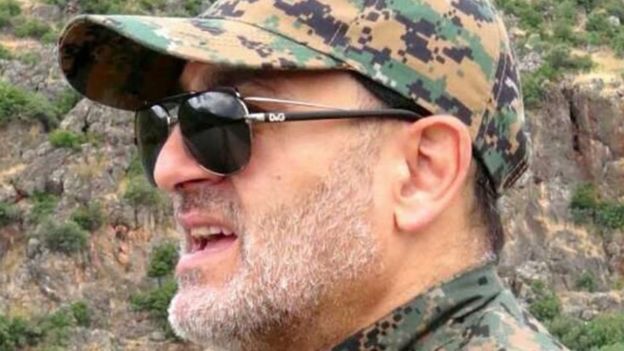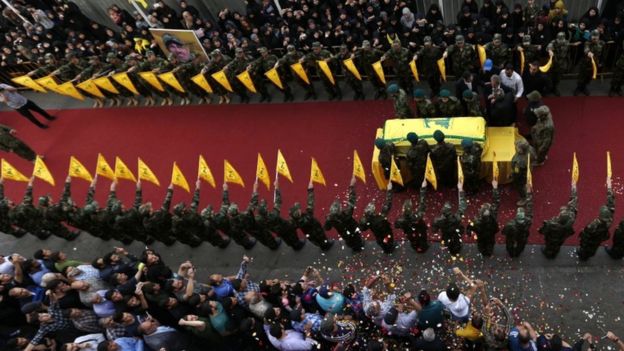Hezbollah killing: Thousands mourn Badreddine at Beirut funeral


Hezbollah members carry the coffin of top Hezbollah commander Mustafa Badreddine, who was killed in an attack in Syria, as his brother mourns his death during his funeral in Beirut’s southern suburbs, Lebanon, May 13, 2016. REUTERS/Jamal Saidi
Thousands of people have attended the funeral in Lebanon's capital, Beirut, of top Hezbollah military commander Mustafa Amine Badreddine.
He died in an explosion near Damascus airport, the Lebanon-based group said, adding it would announce "within hours" its report into the killing.
Hezbollah has sent thousands of troops to support Syria's President Assad.
In 2015, the US said that Badreddine was behind all Hezbollah's military operations in Syria since 2011.
He was also charged with leading the assassination of former Lebanese PM Rafik Hariri in Beirut in 2005.
Images from the funeral showed the coffin being carried among a mass of supporters in the southern suburbs of Beirut, some of them chanting "Death to America" and Shia slogans.
The BBC's Quentin Sommerville, in the capital, says some at the funeral blamed Israel for the killing, with one mourner saying: "Hezbollah has many spies."
Another said that without Badreddine, "Daesh [another name for so-called Islamic State] would be here".
What do we know of the killing?
An initial report by Lebanon's al-Mayadeen TV said that Badreddine, 55, had died in an Israeli air strike. But a later statement by Hezbollah on al-Manar's website did not mention Israel.
Israel's government traditionally refuses to comment on such deaths and has done so again.
But Israel has been accused by Hezbollah of killing a number of its fighters in Syria since the conflict began.
The group was established in the wake of the Israeli occupation of Lebanon in the early 1980s, and has called for the "obliteration" of Israel.
Asked who might have carried out the attack, Hezbollah deputy leader Sheikh Naim Qassem said that, within hours "we will announce in detail the cause of the explosion and the party responsible for it", adding there were clear indications of those responsible.
One Hezbollah MP in Lebanon, Nawar al-Saheli, said: "This is an open war and we should not pre-empt the investigation but certainly Israel is behind this. The resistance will carry out its duties at the appropriate time."
Yaakov Amidror, a former national security adviser to Israeli PM Benjamin Netanyahu said: "We don't know if Israel is responsible for this. Remember that those operating in Syria today have a lot of haters without Israel.
"But from Israel's view, the more people with experience, like Badreddine, who disappear from the wanted list, the better."
However, any of the armed groups seeking to overthrow President Bashar al-Assad might have have sought to kill the man co-ordinating Hezbollah military activities.
Are there other versions of his death?
A number of Twitter accounts supporting Syrian rebel groups and the al-Qaeda-affiliated al-Nusra Front said Badreddine was killed in a battle in Khan Touman, southern Aleppo, rather than in Damascus.
Khan Touman was captured by a coalition of groups including al-Nusra Front last week and has been subject to heavy shelling in recent days.
No official sources have commented on the reports.
What is Badreddine's background?
Born in 1961, Badreddine is believed to have been a senior figure in Hezbollah's military wing. He was a cousin and brother-in-law of Imad Mughniyeh, who was the military wing's chief until his assassination by car bomb in Damascus in 2008.
According to one report, a Hezbollah member interrogated by the Canadian Security Intelligence Service (CSIS), described Badreddine as "more dangerous" than Mughniyeh, who was "his teacher in terrorism".
They are alleged to have worked together on the October 1983 bombing of the US Marine Corps barracks in Beirut that killed 241 personnel.
Badreddine is reported to have sat on Hezbollah's Shura Council and served as an adviser to the group's overall leader Hassan Nasrallah.
An indictment from the ongoing Special Tribunal for Lebanon in The Hague details Badreddine's role in bombings in Kuwait in 1983, that targeted the French and US embassies and other facilities, and killed six people.
He was sentenced to death over the attacks, but later escaped from prison.
Was he involved in the killing of Hariri?
Badreddine was tried in absentia by the Hague tribunal over the killing of Rafik Hariri.
He was indicted on four charges and was said by the tribunal to be "the overall controller of the operation" to kill Mr Hariri.
Three other Hezbollah members also stand accused of their role in the assassination.
One mourner at the funeral asked about Badreddine's involvement said simply "lies".
What is Hezbollah doing in Syria?
The Lebanese Shia Islamist movement has played a major role in helping Iran, its main military and financial backer, to prop up the government of President Assad since the uprising erupted in 2011.
Thousands of Hezbollah fighters are assisting government forces on battlefields across Syria, particularly those near the Lebanese border, and hundreds are believed to have been killed.
Политика конфиденциальности | Правила пользования сайтом











